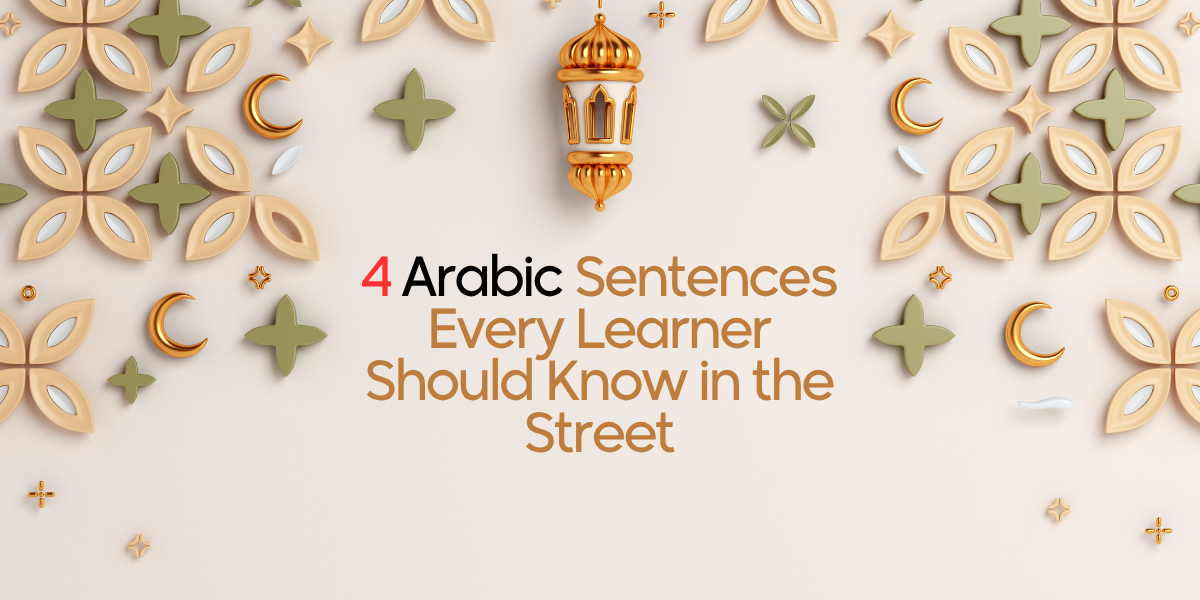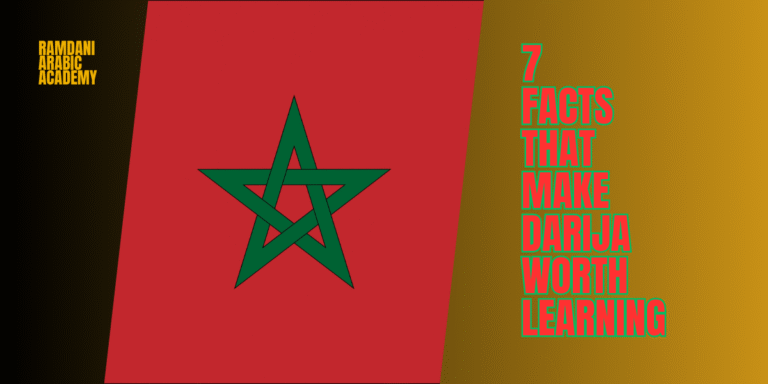4 Arabic Sentences Every Learner Should Know in the Street
When you walk through an Arab street, you don’t just hear a language. You feel it.
The rhythm, the tone, the gestures—all connect to daily life.
Arabic in the street is not the same as Arabic in a classroom. In class, you learn grammar, structure, and proper pronunciation. On the street, you learn how people actually talk. You learn how they greet, joke, and express emotion. You learn what words mean when spoken fast, with a smile, or in frustration.
Many learners spend years studying Arabic but struggle to hold a short conversation with locals. They know the rules but miss the real use. The street language is alive. It changes from one city to another, sometimes even from one neighborhood to another. The Arabic you hear in Cairo sounds different from what you hear in Beirut, Casablanca, or Riyadh. Yet, all share something in common—a strong sense of identity and daily rhythm.
Street Arabic is where culture meets communication. It reflects how people live, think, and feel. You hear shopkeepers calling out to customers, friends teasing each other, and drivers shouting at traffic. Every sound teaches something. When you listen carefully, you start to understand the culture, not only the words.
Learning these expressions opens doors. Locals start to see you as part of their world, not just as a visitor. They appreciate when you use a few words that sound natural. It shows effort and respect. A simple phrase can make someone smile or help you find your way in a busy market.
You don’t need to master every dialect to speak with confidence. You just need a few real sentences that people use daily. Phrases that carry meaning, not only structure. Expressions that sound natural and practical. When you know how to say “How are you?”, “Thank you,” or “Excuse me” in a local way, conversations become smoother and more human.
Arabic is one of the oldest and richest languages on earth. But in the street, it becomes light, fast, and full of humor. That’s why it’s important to learn the Arabic that lives outside textbooks. You can’t fully understand the language if you never step into the rhythm of daily speech.
In this article, we’ll explore four common sentences you can use in the Arabic street. They are simple but powerful. You’ll see how they change meaning depending on context, tone, and region. You’ll also understand why locals use them the way they do.
This guide is not about perfect grammar. It’s about connection. It’s about helping you speak in a way that feels real. At Ramdani Arabic Academy, we believe that language learning starts with people, not with books. The street is your best classroom. The people are your best teachers.
Are you ready to sound more natural when you speak Arabic? Let’s start with the first sentence.
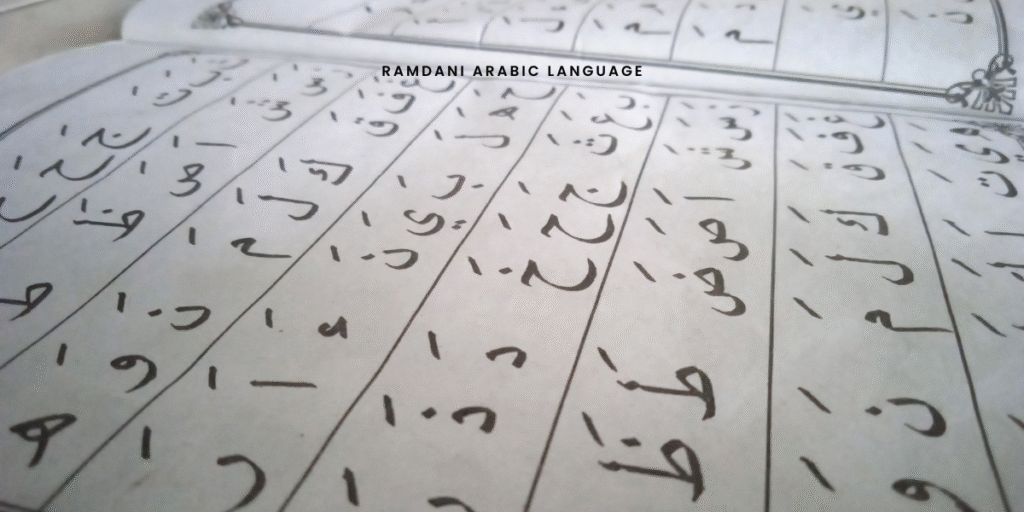
The First Sentence: “Salam Alaikum”
If you walk anywhere in the Arab world, you will hear one phrase again and again.
“Salam Alaikum.”
It means “Peace be upon you.”
This greeting is more than a hello. It carries culture, respect, and warmth. Arabs use it with friends, strangers, elders, or anyone they meet. It’s a small sentence that creates a bridge between people.
When someone says “Salam Alaikum,” the proper reply is “Wa Alaikum Salam,” which means “And peace be upon you too.” This exchange happens everywhere—shops, streets, buses, and homes. It’s polite, friendly, and expected. If you greet people this way, they instantly feel comfortable with you.
Many learners think “Marhaban” or “Ahlan” are enough to say hello. These are fine, but “Salam Alaikum” reaches deeper. It fits every situation—formal or casual. You can use it in the market, with a taxi driver, or when meeting a family. It always sounds right.
You can hear different pronunciations depending on the country. In Morocco, people say it fast—“Slaamlekum.” In Egypt, it becomes “Salam Aleeko.” In the Gulf, “Salam Alaikum” stays close to the classical form. No matter the version, everyone understands it.
Using this greeting shows that you respect local customs. It also helps you start any conversation on a positive note. When you use it, people often respond with a smile. You sound more like someone who understands the local way of life.
Here’s how you can practice it.
Say it slowly at first. Listen to how locals pronounce it. Repeat it until it feels natural. Try to use it whenever you meet someone new. The goal is not to sound perfect but to sound comfortable.
If you’re buying something in the market, start with “Salam Alaikum.” The seller will likely reply and engage with you. Then you can continue with what you need. This small step changes the whole mood of the exchange. It turns a transaction into a conversation.
For learners, understanding the social meaning of this phrase matters as much as learning the words themselves. “Salam Alaikum” is not only a greeting. It’s a message of peace, trust, and connection. When you use it, you’re showing more than language ability—you’re showing awareness of the culture.
Remember that Arabic is a language of respect. How you greet people affects how they respond to you. Start with peace, and peace usually comes back to you.
At Ramdani Arabic Academy, we always tell our students that communication begins with tone and intention. “Salam Alaikum” is the perfect example. It’s the first door into the Arabic world. Once you open it, everything else becomes easier.
Next, we’ll move to the second sentence—one that you’ll use in daily interactions to sound even more natural in the street.
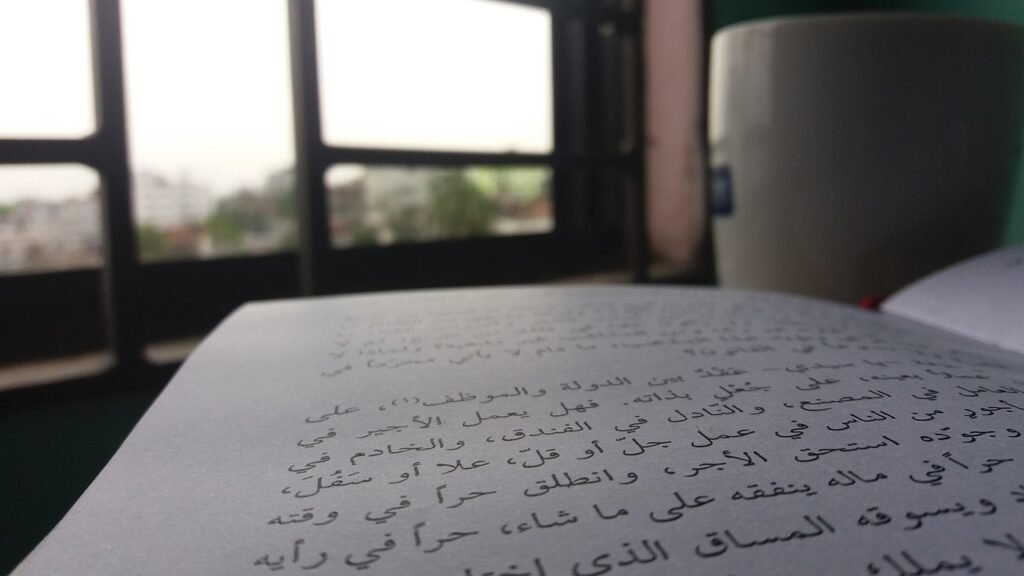
The Second Sentence: “Shukran”
After a greeting, the next word that connects you with people is “Shukran.”
It means “Thank you.”
This sentence is short but powerful. It shows respect and gratitude. You’ll hear it in every Arabic-speaking country, used in shops, restaurants, taxis, and homes. When someone helps you, hands you something, or serves you food, “Shukran” is the natural response.
Arabic culture values politeness. Saying “Shukran” is not just about manners. It shows that you see the person and appreciate the gesture. People notice when you use it. It’s a simple word that builds goodwill fast.
When someone tells you “Shukran,” the usual reply is “Afwan,” which means “You’re welcome.” Sometimes you might also hear “Ala rasi,” meaning “On my head,” a warmer and more personal way to say you’re welcome. These responses vary depending on the region, but they all carry the same sense of kindness.
Listen carefully to how people pronounce “Shukran.”
In Egypt, it often sounds like “Shokran.”
In Morocco, you might hear “Choukran.”
In Lebanon, it’s close to the standard form.
Each version has a local flavor, but all are easily understood.
Try using “Shukran” every time someone helps you, no matter how small the act.
When the shopkeeper gives you your change—say “Shukran.”
When a waiter brings your tea—say “Shukran.”
When a stranger gives you directions—say “Shukran.”
These small interactions matter. They show humility and understanding of local etiquette. You don’t need long sentences. One sincere word is enough.
“Shukran” also helps you sound confident. Many learners worry about making mistakes in Arabic, but this word is always safe. It fits any setting, any time, with anyone. When you say it naturally, people recognize that you’re making an effort to connect, not just to speak.
Here’s a practical tip.
Add a soft tone when you say it. Don’t rush the word. Say it clearly and calmly—“Shukran.” The tone carries more meaning than the word itself. Arabs often express emotion through voice, not only through vocabulary.
At Ramdani Arabic Academy, we remind our learners that mastering simple expressions builds a solid foundation. You don’t need big vocabulary lists to communicate well. You need to use a few key sentences with confidence and warmth. “Shukran” is one of them.
Every time you use it, you make the interaction smoother. You earn respect. You learn to speak not just Arabic but the emotion behind it.
Language is not only about grammar—it’s about feeling.
And gratitude is a feeling everyone understands.
Next, we’ll move to the third sentence, one that helps you handle real-life situations in the Arabic street with ease.
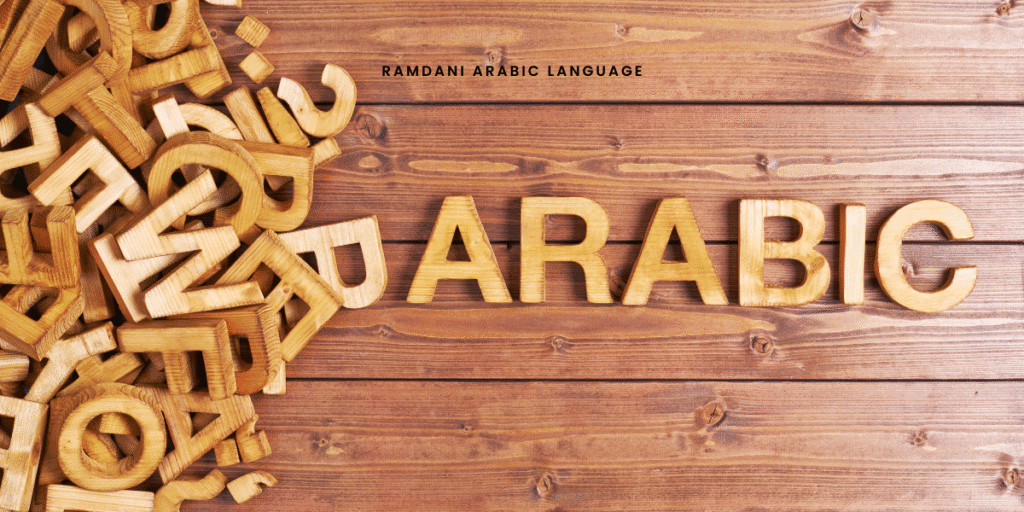
The Third Sentence: “Lao Samaht”
You’ll hear this phrase often in Arab streets, especially in markets, cafes, or when asking for help.
“Lao Samaht” means “Excuse me” or “If you please.”
It’s one of the most practical sentences you can learn. You can use it to get someone’s attention, ask for something politely, or pass through a crowd. It works in almost every situation.
Politeness matters deeply in Arab culture. Words like “Lao Samaht” soften your tone and show respect. They turn a command into a request. They make people more willing to help you. When you use this phrase correctly, it opens doors—literally and socially.
In some countries, you’ll hear slight variations.
In Egypt, people often say “Law samaht.”
In the Levant, you might hear “Lau samaht.”
In Morocco, “Llah ykhalik” carries a similar meaning—“May God protect you,” used as a polite way to say “Please.”
Each version fits the local rhythm, but all express the same idea—respect.
Here’s how you can use it:
- When you want to ask for directions:
“Lao Samaht, wayn el-mat’am?” – “Excuse me, where is the restaurant?” - When you want to buy something:
“Lao Samaht, bikam hada?” – “Excuse me, how much is this?” - When you’re trying to pass through:
“Lao Samaht” said with a smile is enough for people to move aside.
The phrase sounds simple, but it has strong social value. Using it shows awareness of cultural manners. Arabs value people who speak politely, especially foreigners. If you use this phrase naturally, you will instantly stand out as someone who respects local customs.
Tone is key.
Say it calmly, with a soft voice. If you raise your tone or sound hurried, the meaning changes. Arabic communication often depends on delivery. A polite voice carries more weight than perfect grammar.
For beginners, “Lao Samaht” is a bridge. It helps you start conversations without fear. You can use it even when you don’t know the next word. You can begin with “Lao Samaht” and then point or gesture. People will understand you. They’ll help you fill in the rest.
At Ramdani Arabic Academy, we always tell students that success in speaking Arabic comes from mastering short, real phrases. These are your tools in the street. Grammar comes later. Understanding people comes first.
When you learn to say “Lao Samaht” with the right tone, you’ll notice something.
People respond differently. They listen. They smile. They guide you.
Language is about connection, and this phrase connects fast.
Next, we’ll move to the fourth and final sentence—one that helps you leave a positive impression wherever you go.
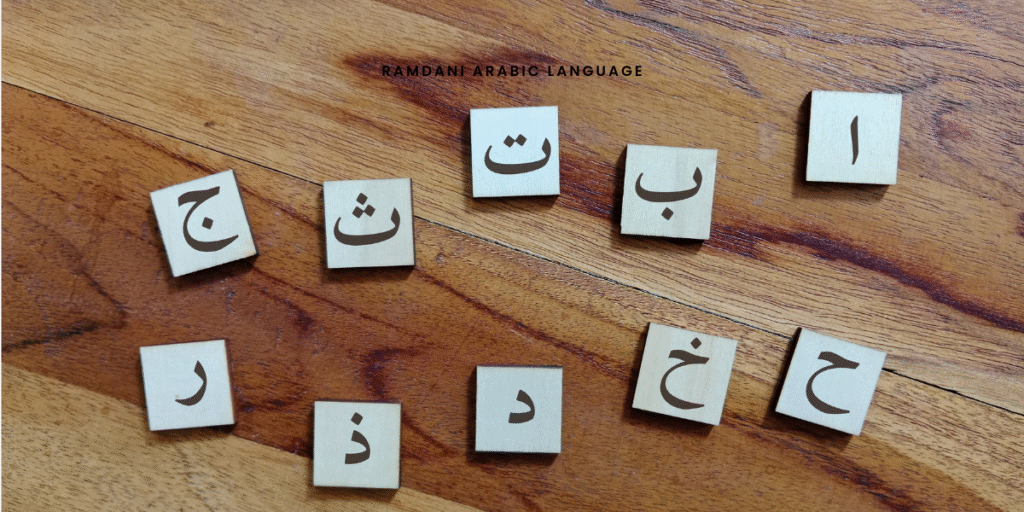
The Fourth Sentence: “Ma’a As-Salama”
When a conversation ends, one sentence closes it with warmth and respect.
“Ma’a As-Salama.”
It means “Go with peace” or simply “Goodbye.”
This phrase carries more than a farewell. It shows care and goodwill. You’ll hear it in every Arab country, spoken by friends, strangers, or shopkeepers. It’s short, gentle, and universal.
When someone says “Ma’a As-Salama,” the usual reply is “Allah ysallmak” in most dialects. That means “May God keep you safe.” It’s not only polite—it’s heartfelt. Arabic culture values parting words that express kindness. Every goodbye holds a blessing.
In daily life, you can use “Ma’a As-Salama” in many places.
- When leaving a store after buying something
- When ending a conversation with someone
- When saying goodbye to a friend or teacher
The tone makes the difference.
Said warmly, it leaves a good impression. Said fast or without attention, it feels empty. Arabs notice tone as much as words.
Regional variations exist, but they all sound close. In Morocco, you might hear “Bsslama.” In Egypt, “Ma’a salama.” In the Gulf, “Ma’a As-Salama” stays closer to the standard form. Each version fits the local sound but carries the same message—peace as you part.
Try this in real situations. When you finish buying something, say “Ma’a As-Salama.” The seller will likely smile and reply with “Allah ysallmak.” That short exchange builds goodwill. It turns a simple transaction into a respectful connection.
Learning this phrase also helps you understand something deeper about Arabic culture. People don’t end interactions abruptly. They close them with care. Even quick street conversations end with a soft goodbye. That respect forms part of daily communication.
You can also use “Ma’a As-Salama” when ending a call, leaving a group, or finishing a lesson. It fits everywhere. Simple, direct, meaningful.
At Ramdani Arabic Academy, we always encourage learners to master beginnings and endings. How you start and how you close a conversation define how people remember you. “Ma’a As-Salama” helps you end every talk on a positive note.
These four sentences—
“Salam Alaikum,”
“Shukran,”
“Lao Samaht,”
and “Ma’a As-Salama”—
are more than phrases. They are tools for connection. They help you speak naturally and confidently in real life.
You don’t need complicated vocabulary to sound fluent. You need to sound real. When you use these expressions daily, you build rhythm, trust, and comfort with the language. You stop translating and start communicating.
Next, we’ll move to the conclusion—a reflection on how to practice these sentences, improve your communication, and how Ramdani Arabic Academy can help learners grow beyond the textbook.
Final word
Speaking Arabic in the street is not about perfect grammar. It’s about connection.
The people you meet don’t expect textbook Arabic. They expect respect, effort, and sincerity. These four sentences—“Salam Alaikum,” “Shukran,” “Lao Samaht,” and “Ma’a As-Salama”—carry all three.
Each one opens a door.
“Salam Alaikum” starts the conversation with peace.
“Shukran” shows gratitude.
“Lao Samaht” asks politely.
“Ma’a As-Salama” closes the exchange with warmth.
If you use them often, you’ll notice a change. Locals will respond differently. They’ll smile more, speak slower, and sometimes even teach you new words. That’s how learning becomes real.
You don’t need hundreds of phrases. You need a few that work everywhere. Focus on tone, rhythm, and timing. Listen more than you speak. Arabic grows through sound. It’s not a language you only study—it’s a language you live.
When you walk through an Arab market, sit in a café, or ride a taxi, you’re not just hearing words. You’re hearing life. Every voice tells you something about the culture. You learn how people think, how they show respect, and how they connect with each other.
Use what you learn daily. Say “Salam Alaikum” to the driver. Say “Shukran” to the waiter. Say “Lao Samaht” when you need help. Say “Ma’a As-Salama” when you leave. Each small act builds confidence. Each moment becomes part of your learning.
At Ramdani Arabic Academy, we believe the real classroom is the world around you. Books help you understand the structure, but people help you understand the meaning. Our lessons focus on the Arabic you hear and use, not only the Arabic you read. We teach how to sound natural, polite, and confident—skills that make you fit in, not just stand out.
Language connects people. It breaks distance. It builds trust. When you speak Arabic with care, people open up. They invite you into their world. You stop being a learner and start being part of the community.
Every learner begins somewhere. Start with these four sentences. Use them until they feel natural. Add new ones slowly. Listen carefully. Speak with intention.
As the founder of Ramdani Arabic Academy, I’ve seen many learners reach fluency by following this path—small steps, real words, constant practice. You don’t need talent. You need patience and daily exposure.
Arabic is not a language you conquer. It’s a language you grow with.
Every “Salam,” every “Shukran,” every “Lao Samaht,” and every “Ma’a As-Salama” moves you forward.
Learn it. Use it. Live it.

